Iran Calls Biden’s Nowruz Message For Iranian Women A ‘Lie’
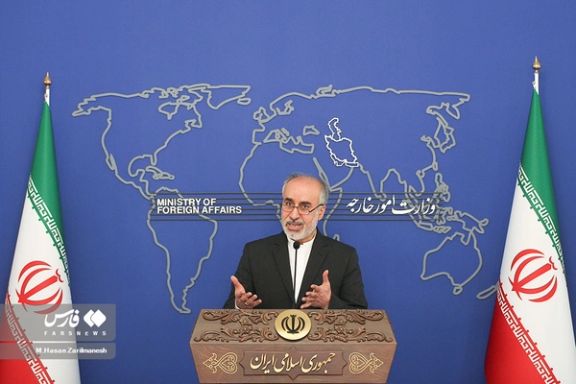
Iran’s foreign ministry spokesman says the message by US President Joe Biden on the occasion of Iranian New Year, Nowruz, supporting Iranian women’s demand for freedom, is a “lie”.

Iran’s foreign ministry spokesman says the message by US President Joe Biden on the occasion of Iranian New Year, Nowruz, supporting Iranian women’s demand for freedom, is a “lie”.
In a tweet on Tuesday, Nasser Kanaani said, “the false claim of supporting Iranian women while Washington intensifies the cruel sanctions against the Iranian nation is a display of the hypocrisy and hostility of the American regime and its anti-Iranian leaders."
US President Joe Biden in a statement on Monday congratulated Iranians on the arrival of Nowruz saying this year, the New Year comes at a difficult time for many families, when hope is needed more than ever—including for the women of Iran who are fighting for their human rights and fundamental freedoms.
“The United States will continue to stand with them, and all the citizens of Iran who are inspiring the world with their conviction and courage. And together with our partners, we will continue to hold Iranian officials accountable for their attacks against their people.”
However, Kanaani claimed in his tweet that “Enmity with the Islamic Republic of Iran and the Iranian nation is a constant part of the foreign policy of the American regime.”
This is Biden's third Nowruz message since he entered the White House. The President and the First Lady also took pictures next to the Haftseen table which is an ancient Persian tradition representing seven symbols to celebrate the beginning of the Iranian new year.
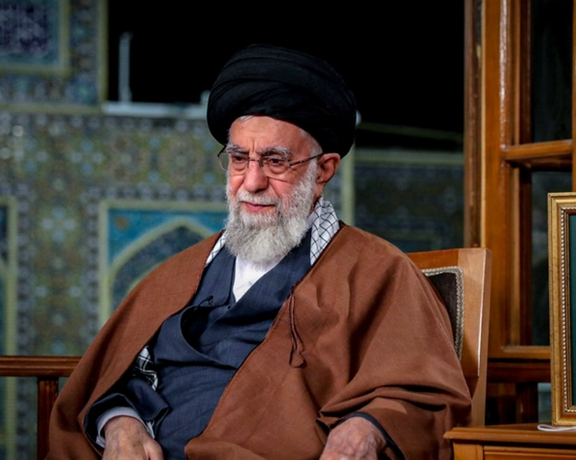
In his Nowruz New Year message to the nation Monday, Iran’s Supreme Leader Ali Khamenei did not mention foreign relations and focused on economic difficulties.
He acknowledged that there are “political problems” but did not directly mention six months of antigovernment protests, arguing that the economic problems the country faces are the main reason for all other problems.
Despite putting emphasis on the economic crisis, mainly because of its confrontational foreign policy, he did not mention the stalled nuclear negotiations with the West, nor the agreement reached earlier this month to restore ties with regional rival Saudi Arabia – a point that he could have mentioned as a positive accomplishment amid a grim reality in the country.
A positive reference to the deal with Riyadh would have gone a long way to reinforce statements by other officials that Iran is bent on improving relations with regional Arab countries and perhaps ending the war in Yemen, where Tehran has rendered military support to Houthis fighting a Saudi coalition.
Khamenei has been a steadfast opponent of the Saudi government and has labelled the country a lackey of the United States, an epitome of “corruption”, meaning un-Islamic and an enemy of Muslim unity. His followers have equated Saudi Arabia with “Zionists”, the worst possible insult in the regime’s lexicon.
Having decided to restore diplomatic relations with Riyadh, Khamenei is perhaps finding it hard to walk back his long-held views. The decision to restore relations was made amid international isolation, economic crisis and the threat of an Israeli attack on its nuclear installations.
However, it was clear that that the decision was his, since he sent his trusted man in the national security council, Ali Shamkhani, to Beijing to sign the agreement on March 10.
Speaking about multiple difficulties Iran faces, Khamenei tried to indirectly imply that the population has no political demands and all problems stem from a weak economy. “The most important problem for the Iranian nation [in the past year] was the problem of the country’s economy, which impacts people’s livelihood,” he said.
However, months of nationwide protests showed that a significant part of the population, especially the youth, reject the Islamic Republic regime altogether and want a secular, democratic political system.
Although he acknowledged the seriousness of economic problems, he did not mention sanctions imposed by the United States, which he and his subordinates have often cited as the reason for a 50-percent annual inflation rate, high unemployment and increasing poverty. It seemed that Khamenei simply decided not to speak about any foreign policy issue.
Having chosen to focus on economic problems, Khamenei tried to “put it in perspective” as he put it.
“Economic difficulties are not unique to us…all countries have some sort of peculiar economic problem, even rich countries,” he said, and went a step further claiming that some “are in much worse situation than we are.”
Iran’s national currency, the rial, has fallen by more than 50 percent since September, pushing food prices higher between 70-100 percent, on top of similar price hikes in the past five years since the imposition of US sanctions. Tens of millions of working and even middle class people have fallen into poverty, not able to afford basic necessities.
The 83-year-old authoritarian ruler proclaimed the new year as the year to fix the economy, increase production and control inflation, slogans often repeated in the past decade.

Iranians, and millions in other countries, celebrate the ancient Nowruz, or New Year on March 21, and begin the year 1402 in the Persian calendar.
Exactly at 54 minutes, 28 seconds past midnight Tehran time on March 21, the ancient Nowruz festivities began with family members assembled around a spread called ‘haftseen’ exchanging holiday greetings and gifts.
The spread, on the floor or on a table, is laden with flowers and sprouted greens, which celebrate the coming of spring, symbols of wealth (coins), fertility (painted eggs), life (goldfish), apples, a mirror, candles, sweets, nuts, a pudding made with wheat germ, and a holy book such as the Quran or a tome of the nationally revered poetry of Hafiz Shirazi.
The names of at least seven of the many items on the spread must begin with the Persian letter ‘sin’, probably the short form of sini (tray) as the custom was to display such items on seven trays.
Nowruz celebrations form an integral part of the Iranian identity. Despite Iran's Islamification fourteen centuries ago, and the Islamic Revolution of 1979, the celebration of Nowruz has endured not only in Iran but also in many of its neighboring countries such as Afghanistan, Turkmenistan, Azerbaijan, and among Kurds in Turkey and Iraq.
History and Origins
Nowruz has been celebrated by Iranians since Achaemenid times (550-330 BC). The word Nowruz, which derives from Old Persian nava sarda (new year) is only attested in Middle Persian. The feast itself has its roots in ancient agricultural festivals which centered around the cycle of nature. Some scholars believe ancient Persians were inspired by the splendor of Babylonian spring festival of Akitu developed their own Nowruz festival.
Some historians also believe that the magnificent Persepolis complex in southern Iran built by Achaemenid kings, or at least parts of the complex such as the Apadana Palace, and the Hundred Columns Hall, were specifically built for celebrating the New Year.
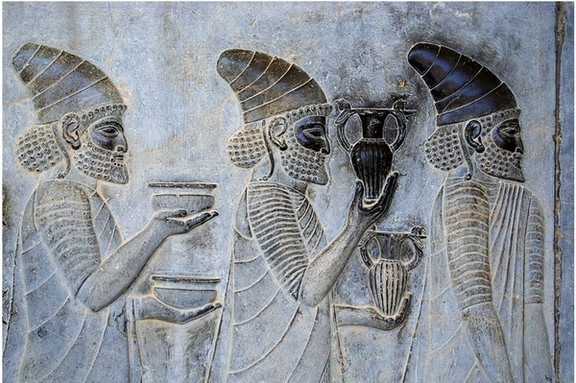
The bas-relief at the Apadana Palace which shows representatives of the nations under the Achaemenid Empire bearing gifts for the King of Kings may be a portrayal of the Nowruz celebration at the heart of the empire.
The Islamic Republic rulers have never embraced the pre-Islamic Nowruz, but they have also not dared to ban it.
Nowruz, Celebration of Spring Equinox
The exact moment of the beginning of the new year, which varies from year to year and was calculated by astronomers since ancient times, marks the Spring Equinox in the northern hemisphere. Accordingly, the turn of the year may fall anytime from the evening of March 20 to the evening of the next day.
Unlike the lunar calendar prevalent in other Muslim countries in which it is the year 1444 now, the new year will be 1402 in the solar Jalali calendar, Iran's unique calendar introduced in 1079 AD.
Like many things in the Iranian history, the calendar seamlessly combines Islamic and ancient Iranian elements. The first year of the calendar is Prophet Muhammad’s hijra from Mecca to Medina but each of its twelve months is dedicated to an ancient Iranian deity.
The Foods Of Nowruz
On the eve, or the day of Nowruz, Iranians make special foods with seasonal and symbolic significance. In the 20th century, rice mixed with lots of green herbs (dill, coriander, fenugreek greens, wet garlic) and served with pan-fried ‘mahi sefid’ fish (Caspian kutum) or other fishes has become highly representative of the food for Nowruz.
Other green food, to celebrate the end of winter and arrival of spring, such as a very green, thick omelet made with the same type of herbs (kuku sabzi) and served with green or plain rice are also very popular.
Apadana, one of the oldest halls of the complex dating to the first half of the 6th century BC, was where the king would hold audience with his subjects, with great pomp on special occasions such as the New Year.
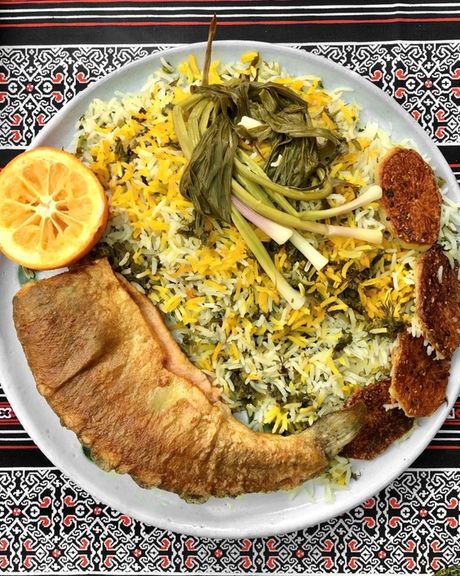
Many families, particularly in central areas where fish was very hard to come by before modern times, make a dish of rice mixed with noodles and served with chicken, dried apricots, and dates instead of the green rice and fish. A stew-like soup with green herbs, legumes and noodles (ash-e reshteh) is also among holiday season foods. Noodles in these dishes symbolize longevity.
During the holiday season, which culminates in the all-important ‘sizdeh be dar’ picnic on the 13th of the first month, Farvardin, people visit family, relatives and friends. Guests are welcomed with sweets, nuts and fruits.


An umbrella organization monitoring political parties in Iran has said that two-thirds of current lawmakers are unlikely to make it to the next parliament.
The Chairman of the Research Center of House of Parties, Mehdi Arab-Sadeq in an interview with moderate-conservative Khabar Online website said that "Some of these lawmakers need to apologize to the Iranian nation" for what they have and have not done at the Majles (parliament).
However, he said that the unpleasant situation is likely to continue as long as political parties are not there to serve the nation's interests, a reference to the fact that these groups are tightly controlled by the core of the regime and become active only weeks before choreographed elections.
Arab-Sadeq also criticized the government for "behaving in a way that the people laugh when officials put forward a new promise or fire off a new slogan." The government has remained inefficient in solving multiple crises, yet it is planning to win the next parliament in the 2024 elections.
Khabar Online presenting the interview described the Iranian year that ended March 20 as "a politically turbulent year" and recalled that this was a year in which 200 of parliament's 290 members who had called on Ebrahim Raisi to run for President in 2021, wrote to him that they regretted their decision. Despite this regret, lawmakers did not act to impeach ministers that they kept criticizing throughout the year.
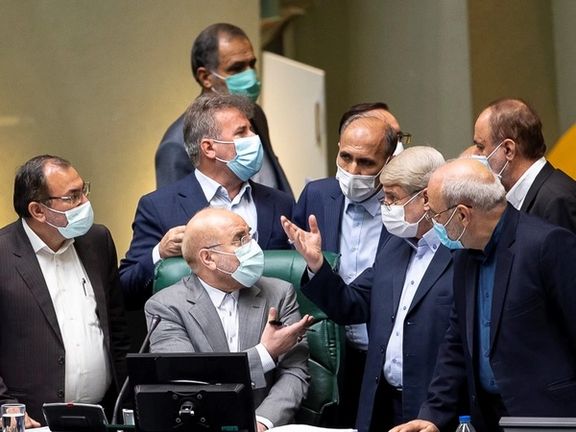
The website added that some top government officials and several members of parliament have been setting up political parties or organizations during the past weeks apparently in preparation for next year’s elections.
Sadeq-Arab in his interview also noted that political parties allowed to exist did not lift a finger during months of widespread antigovernment protests.
He added that given the political and economic situation, at least two third of the 290 lawmakers cannot win enough votes to enter the next parliament.
Iranian lawmaker Ahmad Alirezabeigi said in an interview with ILNA website in Tehran, that the government does not listen to lawmakers' advice. "We told the government over and over that its economic vehicle is broken, but the only thing it did was changing the driver," he said, alluding to the change of the governor of the central bank and the ministers of labor and housing during the past year.
Alirezabeigi attributed most of the country's current economic chaos to the government's manipulation of foreign currency market, where the Iranian rial has seen its steepest fall in recent months. He argued that government intervention cannot solve the problem as it did not do so under previous governments. He charged that successive administrations have poured some $280 billion dollars of hard currency into the market since the 1990s to support the rial, without success. The currency has fallen almost 50-fold in the past 25 years.
Meanwhile, criticizing the government's inefficiency, Alirezabeigi said all of the current economic problems could have been predicted and prevented if officials were real experts. He further charged that the current government has totally lost the ability to control the supply and prices of essential commodities. As a result, industries and those involved in entrepreneurship in the centrally controlled economy have lost their hope and do not know how to survive.

The former chief of Israel's Atomic Energy Commission has warned Benjamin Netanyahu that his judicial changes will weaken Israel's position in confronting Iran.
According to the Ynet news, Zeev Snir, a Netanyahu appointee who led the atomic commission from 2015-2022, sent a letter to the Prime Minister on Sunday, expressing his concerns.
Benjamin Netanyahu has started his sixth term as prime minister by forming a coalition of right-wing religious extremists who intend to change the country's judicial rules.
Opponents of the government, who believe that the process will lead their country to a religious dictatorship, call the changes in the judiciary a "government coup" and warn against the "collapse" of democratic foundations in Israel.
In his letter, Snir said focusing on advancing the far-reaching changes to the judiciary would undercut Netanyahu’s ability to obtain the key aims he laid out, particularly in terms of countering Iran.
“Strategic competition with Iran requires enlisting all of the State of Israel’s resources and cultivating its power militarily, economically, diplomatically and socially. Iran is strengthening its position and capabilities in terms of its nuclear [program], ties with Russia and China, dealing with sanctions, and more,” he said. “All this as the West, led by the US, is busy with competing with China, the war in Europe, the fight with Russia and the energy crisis.”
Before Snir, a number of former senior officials, who were appointees of Benjamin Netanyahu, have warned about the security, economic and diplomatic consequences of judicial changes.
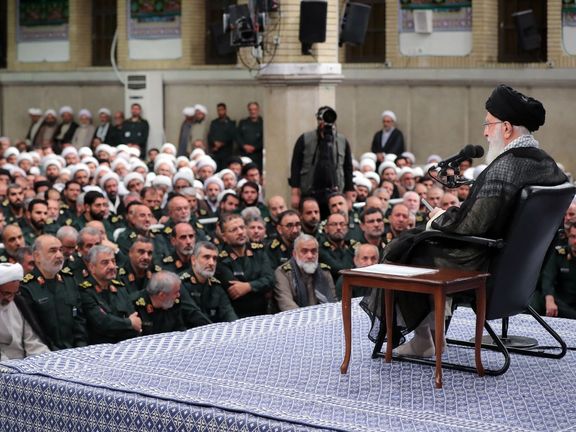
Members of IRGC’s Quds Force are weary of the fight with Israeli forces at Golan Heights and are selling military intel to Israel, a recently-leaked document shows.
Minutes of a meeting of senior clerics and Revolutionary Guard commanders with Supreme Leader Ali Khamenei, leaked to media last week, suggest that the economic and political situation in Iran has made the Islamic Republic’s forces sell information about Quds Force operations to Israel, and that more and more elements are seeking to leave the battlefield in Syria and get jobs and positions inside the country.
The 44-page document contains citations of remarks by 45 IRGC commanders and clerics at a meeting at Khamenei’s office on January 3 on the anniversary of the death of Quds Force commander, Qassem Soleimani, who was killed by the US three years ago.
Almost all the participants spoke about the current wave of antiregime protests that has engulfed the country since September last year. The meeting, held more than three months into the protests, focused on the negative impact of the protests on the morale of forces under the command of the IRGC and their burn-out, with several offering anecdotal accounts of insubordination.
The document indicates that officials are shocked by the large scale and duration of the protests and admit that they do not have the means to quell the uprising. The participants also acknowledged massive defections and desertions among the military forces and clerics, mainly due to the unrelenting economic woes as well as in protest to the heavy-handed crackdown by security forces and harsh sentences by the judiciary.
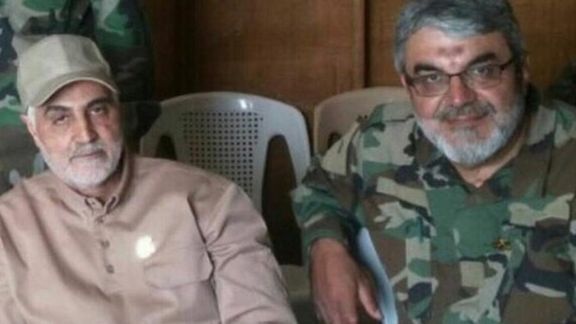
Rahim No’i Aghdam, who served as the commander of IRGC’s Zeynab operational headquarters in Syria, said during the meeting that the Quds Force "faces many problems" in the border areas of Israel and the Golan Heights. He mentioned Israel's "non-stop" bombings and "inability of quick access to the supplies of Iran's allied forces in this region" as some of the problems, adding that economic hardships and the ongoing protests have also led to "ideological issues and family problems" among the ranks of the forces.
He said that "leaks of operational plans” has reduced the edge of Iranian forces against Israelis, adding that "pre-emptive attacks by Israeli forces in five operations showed us that the issue of infiltration... and the forces’ unwillingness to remain at Israel's borders” have made them do “unimaginable” things, such as selling military intel.
No’i Aghdam added that if the Islamic Republic loses the areas that it has gained "with years of effort" outside its borders, "a practical threat to the Islamic Republic regime will not be unimaginable."
Other attendees also talked about the desertions and disobedience within their forces, with Abdollah Haji-Sadeghi, Khamenei’s representative in the IRGC, saying that “there is no doubt about desertions.” He said that different security organizations of the country have reported varying figures, from 12 percent to 68 percent of desertions.
Khodarahm Sarani, the IRGC’s commander in the city of Zahedan -- the provincial capital of Sistan-Baluchestan province that is home to Iran's Sunni Baluch minority of up to two million – said the demands of the people there are basic such as water and basic necessities. He added that remarks by their Sunni leader Mowlavi Abdolahamid have united the residents, making them leave aside their sectarian differences and focus on popular demands.
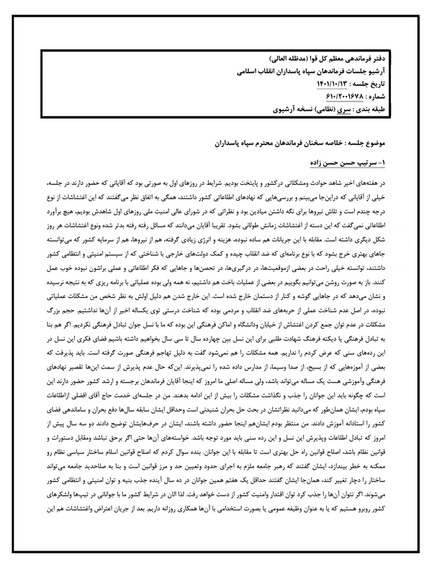
Sarani then made a direct attack on the secretary of Iran’s security council Ali Shamkhani who was present at the meeting. “When an officer under my command comes to my office and shows the watch worn by Mr. Shamkhani's son and tells me that the price of this watch is equal to four years of my service in the armed forces, how can I answer?”
“We cannot always blame the problems on the enemy, yes, we are under sanctions, but the country's income is not low. If there are problems in the country, then how come these problems do not show themselves at the level of military commanders,” he added.